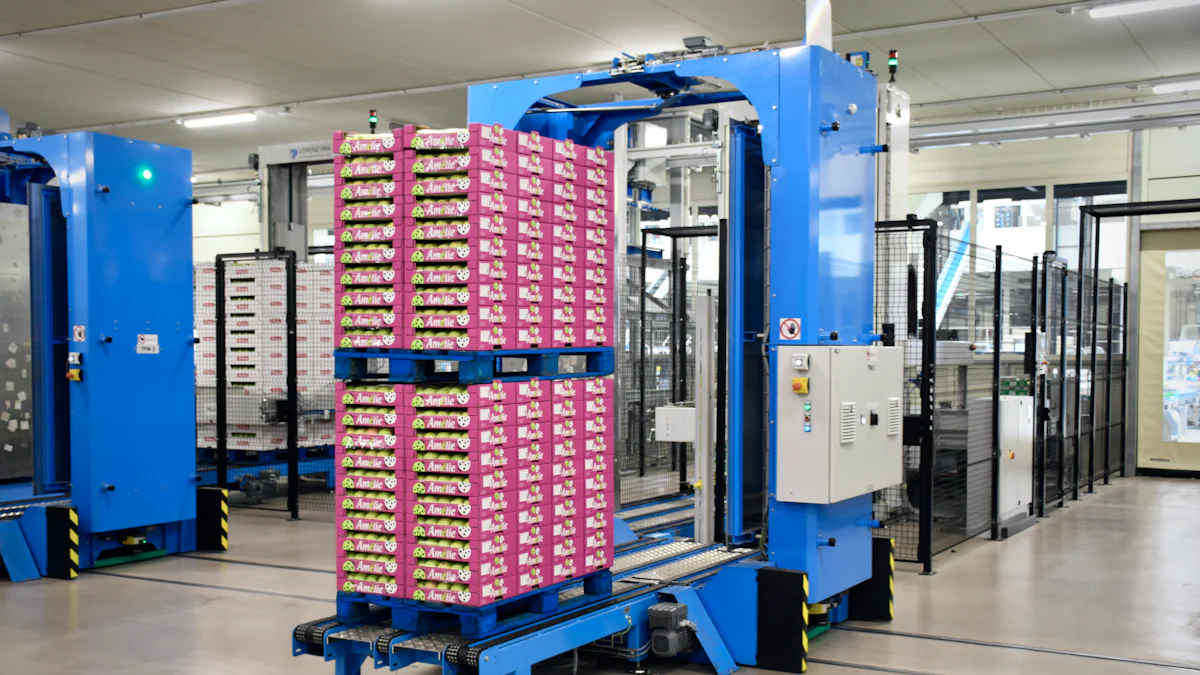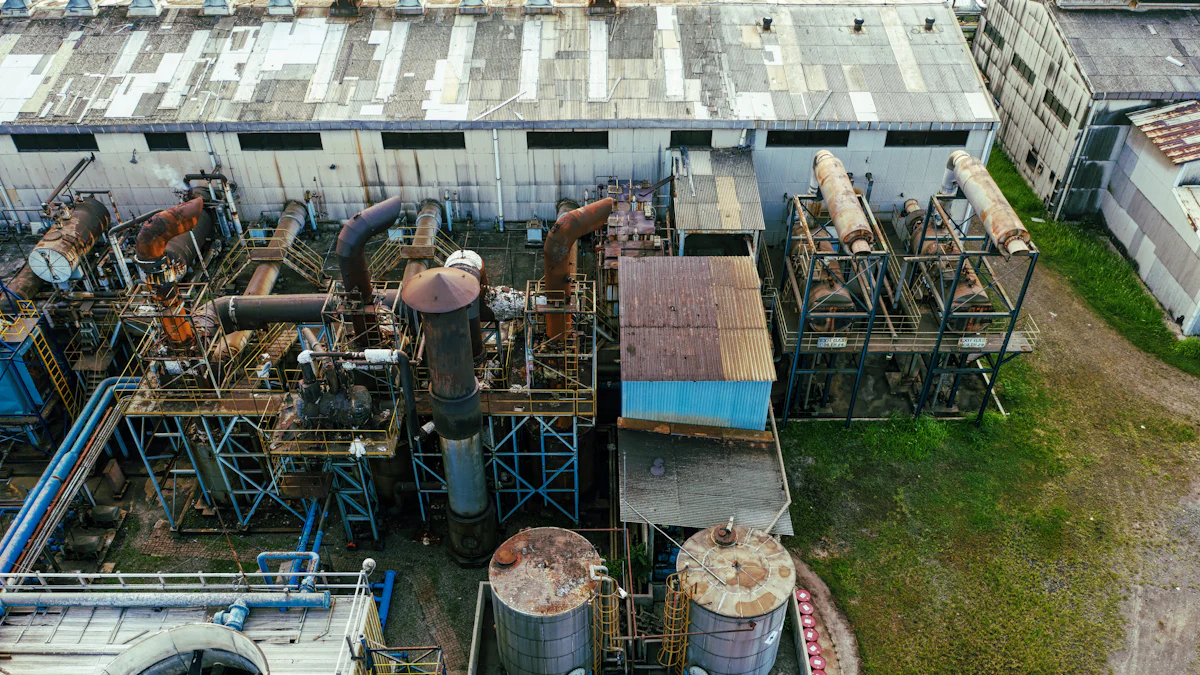How Intelligent Systems Enhance Global Warehousing Efficiency

Intelligent warehousing systems transform global logistics by enhancing efficiency. These systems automate routine tasks, reducing human errors and operational costs. Smart warehouses optimize storage space and ensure timely delivery of goods. Technologies like automated order processing and inventory storage systems minimize expenses and improve order accuracy. Automation technologies such as robotics and conveyor systems further optimize workflows. This leads to increased productivity and reduced labor costs. The integration of cutting-edge technology drives the industry forward, making warehouses more productive and quicker.
The Role of Intelligent Warehousing Systems
Intelligent warehousing systems revolutionize the logistics industry. These systems enhance efficiency and accuracy in global supply chains. Automation plays a pivotal role in these advancements.
Automation in Warehousing
Automation transforms traditional warehousing operations. Intelligent warehousing systems automate storage and retrieval processes. This automation reduces human error and increases operational speed.
Automated Storage and Retrieval Systems (AS/RS)
Automated Storage and Retrieval Systems (AS/RS) optimize space utilization. These systems use advanced technology to store and retrieve items efficiently. AS/RS minimizes the need for manual labor, reducing costs and errors. Businesses benefit from faster order fulfillment and improved inventory management.
Robotics in Warehousing
Robotics enhances the capabilities of intelligent warehousing systems. Robots handle repetitive tasks with precision and speed. Warehouses experience increased productivity and reduced labor costs. Robotics ensures consistent performance, improving overall efficiency.
JUSDA's Intelligent Warehousing System
JUSDA offers an advanced intelligent warehousing system. This system integrates cutting-edge technologies to streamline operations.
Integration of AI and IoT
Artificial Intelligence (AI) and the Internet of Things (IoT) power JUSDA's intelligent warehousing system. AI analyzes data to optimize inventory management and demand forecasting. IoT devices provide real-time tracking and monitoring of goods. This integration enhances visibility and control over supply chain processes.
Real-time Monitoring and Data Analysis
Real-time monitoring is a key feature of JUSDA's intelligent warehousing system. The system collects and analyzes data continuously. Businesses gain insights into operational performance and potential risks. Data-driven decisions lead to improved efficiency and customer satisfaction.
Benefits of Intelligent Warehousing Systems:
Enhanced order fulfillment speed
Improved customer satisfaction
Reduced operational expenses
Intelligent warehousing systems offer significant advantages. These systems optimize business processes and eliminate bottlenecks. Companies achieve precise inventory management and fast order processing. The adoption of intelligent warehousing systems continues to grow, driven by technological advancements and market demands.

JUSDA Solutions
To provide you with professional solutions and quotations.
Artificial Intelligence and Machine Learning
Artificial Intelligence (AI) and Machine Learning (ML) play a crucial role in modern warehousing. These technologies enhance the efficiency of inventory management and demand forecasting. Businesses can achieve significant improvements in operational performance by integrating AI and ML into intelligent warehousing systems.
AI-driven Inventory Management
AI-driven inventory management revolutionizes how businesses handle stock levels. Advanced algorithms analyze vast datasets quickly and accurately. This process ensures optimal inventory levels and reduces waste.
Predictive analytics for inventory optimization
Predictive analytics uses AI to forecast demand accurately. Businesses can optimize inventory turnover and minimize stockouts. This approach enhances supply chain visibility and improves customer satisfaction. AI-powered systems process data at an unparalleled scale and speed, unlike traditional methods that rely on manual input.
Real-time tracking and monitoring
Real-time tracking provides businesses with up-to-date information on inventory status. Intelligent warehousing systems utilize IoT devices to monitor goods continuously. This capability allows for quick decision-making and better resource allocation. Businesses benefit from reduced carrying costs and increased operational efficiency.
Machine Learning for Demand Forecasting
Machine Learning enhances the accuracy of demand forecasting. Algorithms analyze historical data to predict future demand patterns. This technology helps businesses plan more effectively and respond to market changes.
Algorithms used in demand forecasting
Various algorithms power demand forecasting in intelligent warehousing systems. These algorithms process large volumes of data to identify trends and patterns. Businesses gain insights into consumer behavior and adjust inventory levels accordingly. This approach reduces the risk of overstocking and understocking.
Accuracy improvements in supply chain management
Machine Learning improves the accuracy of supply chain management. Intelligent warehousing systems leverage ML to enhance productivity and streamline operations. Businesses experience fewer disruptions and maintain optimal stock levels. This technology empowers decision-makers to focus on strategic initiatives rather than routine tasks.
Benefits of AI and ML in Warehousing:
Improved customer satisfaction
Intelligent warehousing systems offer transformative benefits through AI and ML integration. Businesses achieve precise inventory management and efficient demand forecasting. The adoption of these technologies continues to grow, driven by advancements in AI and ML.
Internet of Things (IoT) in Warehousing

The Internet of Things (IoT) transforms warehousing operations. IoT devices enhance efficiency and visibility in the supply chain. Managers gain real-time insights into inventory and logistics processes.
IoT-enabled Tracking Systems
IoT-enabled tracking systems revolutionize inventory management. Warehouses utilize RFID and sensor technologies to monitor goods. These technologies provide accurate data on product location and status. Managers can track items throughout the supply chain. This capability reduces errors and improves operational efficiency.
RFID and Sensor Technologies
RFID and sensor technologies play a crucial role in intelligent warehousing systems. These technologies automate data collection and processing. Warehouses benefit from reduced manual labor and increased accuracy. RFID tags and sensors provide real-time updates on inventory levels. Managers can make informed decisions based on precise data.
Enhancements in Supply Chain Visibility
IoT devices enhance supply chain visibility. Intelligent warehousing systems utilize sensors to monitor environmental conditions. Managers receive alerts about temperature fluctuations or potential risks. This information ensures product quality and safety. Enhanced visibility leads to improved customer satisfaction.
Smart Warehousing Solutions
Smart warehousing solutions integrate IoT with existing systems. This integration streamlines operations and optimizes resource utilization. Managers experience improved workflow efficiency and reduced costs.
Integration of IoT with Existing Systems
Integrating IoT with existing systems enhances warehouse operations. Intelligent warehousing systems connect various devices and platforms. This connectivity enables seamless communication and data sharing. Managers can coordinate tasks and optimize processes effectively.
Benefits of Real-time Data Collection
Real-time data collection offers significant benefits. IoT devices provide continuous monitoring and reporting. Managers gain insights into operational performance and potential issues. This information supports proactive decision-making and risk management. Real-time data collection enhances productivity and competitiveness.
The intelligent warehousing system leverages IoT technology for optimal performance. Warehouses achieve greater efficiency and accuracy through automation. IoT devices improve asset utilization and safety. The adoption of IoT in warehousing continues to grow. Businesses recognize the value of enhanced visibility and control.
Data and Projections
Current Trends in Smart Warehousing
Smart warehousing continues to gain traction across industries. Businesses increasingly adopt intelligent systems to enhance operational efficiency. The global market for intelligent warehousing systems shows robust growth. Analysts project a significant annual growth rate of up to 54 percent. This trend reflects the increasing reliance on automation technologies.
Organizations recognize the transformative power of AI and machine learning. These technologies boost revenue and improve customer experiences. A recent survey indicates that 42 percent of enterprise-scale businesses have integrated AI into their operations. Additionally, 38 percent of organizations have implemented generative AI. These statistics highlight the widespread adoption of intelligent systems.
The logistics industry benefits greatly from AI-driven automation. Automated processes speed up warehousing activities. Intelligent warehousing systems enhance control over management functions. This shift drives the growth of the smart warehousing industry. AI-based inventory forecasting gains popularity in the retail sector. Retailers and logistics companies eliminate pain points through automation.
Future Outlook
The future of warehousing holds exciting possibilities. Emerging technologies promise to revolutionize the industry further. Innovations such as blockchain and augmented reality offer new opportunities. These technologies enhance transparency and efficiency in supply chains.
Long-term impacts on global supply chains appear promising. Intelligent warehousing systems will continue to evolve. Businesses will experience improved accuracy and reduced costs. Enhanced visibility and real-time data collection will become standard practices. Companies will leverage these advancements to remain competitive.
AI and machine learning will play a pivotal role in shaping the future. Organizations will increasingly rely on predictive analytics. This approach will optimize inventory management and demand forecasting. The integration of cutting-edge technologies will drive the industry forward.
Intelligent systems in warehousing offer numerous benefits. Businesses experience reduced labor costs, improved efficiency, and decreased operational errors. Automation technologies like robotics enhance productivity and resource allocation. AI-driven insights lead to better decision-making and cost savings. The future holds immense potential for technology to further enhance efficiency. IoT enables real-time monitoring and visibility, transforming warehouse operations. Embracing innovation remains crucial for staying competitive. Organizations investing in advanced technologies reap significant financial value. The logistics industry must continue adopting these advancements to achieve long-term success.
See Also
Enhancing Warehouse Efficiency with Robotic Automation Demystified
Logistics Robotics Empowerment: Boosting Warehouse Efficiency
AI Supply Chain Breakthroughs: Unleashing Efficiency
Tomorrow's Logistics Revolution: AI Supply Chain Impact
High-Tech Warehouse Benefits: Embracing the Automated Future
